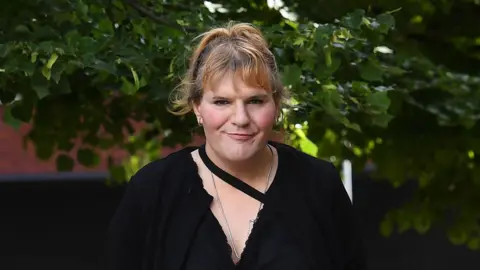In a significant case that has attracted public attention, former Conservative Member of Parliament (MP) Jamie Wallis, who now identifies as Katie Wallis, has been sentenced for harassing her ex-wife, Rebecca Wallis, currently known as Rebecca Lovell. This incident highlights not only the complexities surrounding personal relationships but also points to broader issues regarding mental health and personal identity.
Katie Wallis, who served as the MP for Bridgend from 2019 until 2024, faced the court earlier this week. The 41-year-old, residing in Butetown, Cardiff, was accused of committing harassment between February 14 and March 21. Although she initially denied the charges, the evidence presented in Cardiff Magistrates Court led to a guilty plea on her part. The law has taken its course, and the former MP was handed down a 12-month community order that includes 12 days of required rehabilitation activity, in addition to a fine comprising £500, plus costs of £650 and a £114 surcharge.
The court proceedings revealed the nature of the harassment accusations. Wallis had perpetrated unwanted phone calls and sent inappropriate messages that were laden with abusive language. These messages included accusatory tones, labeling her former spouse as “mean” and attempting to pry into the details of her new relationship. One particularly alarming message demanded a sum of £350,000 within a ridiculously short timeframe and also contained threats of emotional distress aimed at ensuring that Wallis’s former wife “never has a happy moment again.”
This situation did not arise in a vacuum. Wallis, who was the first British MP to openly express her transition to a female identity, admitted during the court session that she is currently navigating the challenges associated with this major life change, stating, “My name is Katie Wallis, but my legal name is Jamie Wallis.” The importance of respect for a person’s identity and pronouns is underscored in this case, reflecting an increasingly prevalent discussion surrounding gender identity in the public sphere.
This unfortunate incident further unfolded with the imposition of a restraining order, effectively preventing any further contact between Wallis and Lovell for a period of 12 months. The emotional ramifications of Wallis’s actions were apparent in the personal impact statement presented by Rebecca Lovell. In her statement, she expressed feelings of being overwhelmed and distressed, indicating that Wallis’s messages left her “drowning in a chaos that was not of my own making.” The sentiment of fear was palpable, as she articulated concerns over potential confrontations at her residence and was left questioning if threats made were credible.
The court also heard that Wallis had found her situation increasingly difficult and had expressed deep emotional challenges connected to her transition. Her barrister, Narita Bahra KC, contended that Wallis was experiencing profound difficulties during this transitional phase. She acknowledged that, despite understanding the wrongness of her actions, Wallis’s emotional turmoil had contributed to the behavior in question. After the distressful messages were sent, Wallis was located by law enforcement and was subsequently sectioned under the Mental Health Act before her arrest and the ensuing charges.
The proceedings, which highlight a tragically complex intersection of personal relationships, mental health, and identity, have caused a stir not only in the political sphere but also in societal conversations focusing on the treatment of individuals who are navigating gender identity issues. The repercussions of Wallis’s behavior have a lasting impact, not only on the victims but also on her own life, illustrating significant consequences stemming from personal conflict and emotional distress.











